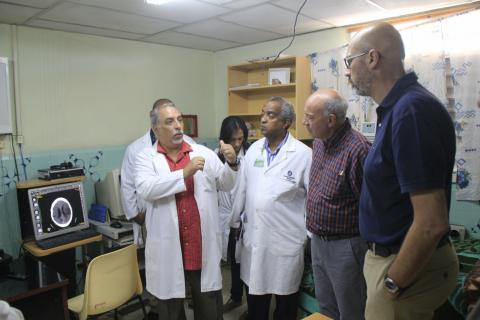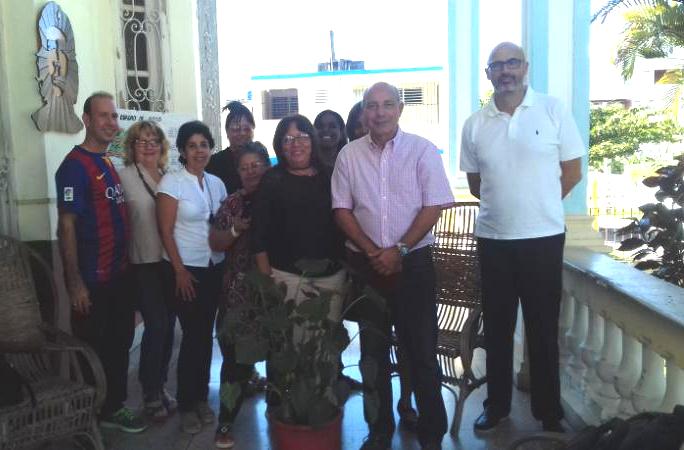
To demonstrate the sustainability of the results obtained by the VLIR IUC Oriente program in pursuit of a second stage, international experts this week engaged in a broad assessment that takes into consideration the impact of the program at the individual, institutional and social levels. José Manuel Febles, PhD (Cuba) and Roberto Escarré Urueña, PhD (Spain) met with members of the projects and exchanged about the generalities of each one and their impact in the academic and social fields.
The impact of the program at the individual level was measured by the views provided by the members in an on-line questionnaire, which addresses aspects related to learning in research stays, the importance of their training to access job and academic promotions , how much the program has represented for the personal and professional growth of the participants, among other topics. "The evaluation also carried out individual interviews with Cuban and Belgian members," said Escarré, "and we could confirm that there is an effective cooperation between the two parties and a great spirit of collaboration."
Among the processes most reviewed and most insisted on was the Transfer of Technology, given the necessary financial sustainability of the program. This is the step that ensures that the scientific and technological advances offered by universities reach a greater number of users and generate significant income for the sustainability of scientific research.
Dr. Escarre said that "we must make a great effort to offer a serious, personalized service. There is a new research based on equipment that did not exist before, and although it has been advanced much more is needed to get close the circle and achieve a technological offer that can be commercialized and establish a series of internal procedures for that to be agile. We have seen very interesting examples of ready-to-transfer products in various projects, you just have to strengthen this office, give it a regulatory framework and create a system of incentives so that this financing also reaches the departments ".
In all the projects belonging to the program, the present and future opportunities of economic sustenance were analyzed, for which, to a greater or lesser extent, all of them exhibit enormous potentialities.
For example, the results of research in the field of biomedical image and signal processing (P2) at the Juan Bruno Zayas Alfonso General Hospital were confirmed, where the Imagis 2.0 "Medical Imaging System" now benefits more than 1000 patients annually in the specialties of Neurology, Pulmonology, Orthopedics, Internal Medicine and others. This same medical institution in Santiago has benefited from the conditioning of the Movement Analysis Laboratory, a technology based on the use of robotics, the only one of its kind in the country.
Also in the area of biopharmaceutical product development (P3), the Laboratory of Antibodies and Experimental Biomodels (LABEX) was visited, a center whose mission is to design, develop and produce in a sustained way biodiagnosticators for the in vitro evaluation of human diseases, and in the Center for Toxicology and Biomedicine (TOXIMED) where technical scientific services are provided that protect man and the environment from chemical risks. In both institutions, doctors Escarré and Febles exchanged with their directors and deepened the need to strengthen the links of research, development, production and marketing that should unite the university and the industry.
The work of P5 focused on the development of energy, biofuels and clean technologies was assessed as having a great impact on the country's energy development. The study of the regeneration of activated carbon in areas of medicine, the sugar sector and the Cuban industry of the Rum was pondered by the officials of these companies who exchanged with the evaluators aspects referred to in addition to the introduction of these scientific results in the productive areas and the leadership of the Universidad de Oriente in the field of renewable energies, at the regional level.
The sociocultural component is more relevant in the project that enhances the heritage against the contemporary challenges of development (P4), which exhibited high incidence in the training of local actors and researchers, in the knowledge and recognition of the heritage values of the city, with emphasis on the Vista Alegre Distribution. In addition, the Historical Archive of Santiago de Cuba was visited, where a sample of the notarial protocols of the seventeenth, seventeenth and nineteenth centuries is studied and which will be given an annotated guide with the transcription and digitalization of photos and documents.
In the same way in the primary school Clodomira Acosta Ferrals of the
Distribution Vista Alegre, Febles and Escarré knew how the love for heritage is stimulated in the children and they reviewed the publications and didactic materials that conformed the teachers after the course of patrimonial education organized by this project in 2016.
To complement the review in the institutional area, the evaluators met this week with Dr. Diana Sedal, Rector of the Universidad de Oriente, and inquired about the difficulties identified by the financiers, among them the still insufficient command of English by the of the academics participating in the program, as well as the delays of the institution in solving specific problems related to the fitting out of premises or others, essential for the implementation and use of resources, among others.
Dr. Diana Sedal highlighted the excellent working relationships with the Belgian leaders who participate in the program. Regarding the use of the English language said that this is one of the most important changes made by the Ministry of Higher Education in Cuba (MES) with the intention of contributing to the comprehensive training of professionals. He also explained that from the experience of the Scientific Doctoral Week organized by the VLIR-IUC between
November 6 and 11, 2017, where all the doctoral students presented their results in English, similar exercises will be carried out at least once once a year, with the aim of increasing the work culture in this aspect.
Dr. José Manuel Febles also suggested that the Languages Department certify by academic certificate the level of English of the participants in this project.
The Rector of the UO recalled that the beginning of the VLIR-IUC program coincided practically with the devastating passage of Hurricane Sandy by this province in October 2012 and the integration process of this university with other higher level academies of the province, which It has represented an increase in enrollment and workers in the same number of spaces. For this reason- said Sedal Yanes - the infrastructural demands of the program have not been responded promptly, nevertheless these actions are already included in the maintenance plan of the 2018 institution, which will respond to almost all of these".
Doctors Roberto Escarré and José Manuel Febles also met with the Vice President for Institutional Relations MSc. Juan Carlos Morgado Roca, Dr. Rosa María Reyes Bravo, Vice-Rector for Research and Postgraduate Studies, and Dr. Maribel Ferrer Vicente, Vice-Chancellor of the Institution, who offered their assessments on these problems and the tasks that are already underway to resolve the demands.
In the last days of evaluation there was talk of a positive balance, a high impact of the program demonstrated at the individual, institutional and social level, substantive missions of the new Cuban university, as Dr. Febles pointed out: "This is the time to consolidate the capacities created in the first phase.
We praise the social impact they have in such important areas as public health, industry, primary education and others".
When summarizing their main considerations, Dr. Febles and Dr. Escarré acknowledged the acceptance of the university community for this evaluation at an intermediate stage of the project, transparency, cooperation in terms of information and the quality of the presentations.
Translator: Maité Elisa Palacios Herrera
Exchange of the evaluators with researchers from the Center for the Study of Noseciences, Processing of Images and Signals (CENPIS)
Tour through areas of the General Hospital Juan Bruno Zayas in which the IMAGIS "Medical Imaging System" is installed and providing services
During the evaluation, the Center of Toxicology and Biomedicine (TOXIMED) of the University of Medical Sciences, important institution for the work of P3, in charge of the study and development of biopharmaceutical products, was visited.
Dr. Escarré proved the impact of the VLIR-IUC Oriente program on the Cuban sugar industry, Cuba Ron and other companies, after the exchange with its directors at the Energy and Refrigeration Studies Center of the Faculty of Mechanical and Industrial Engineering.
MSc. Harold Crespo Sariol shows an implement designed thanks to his research
stays at the University of Hasselt. It is a useful resource for taking samples
of rum, necessary for the study of the reuse of activated carbon in the Cuban
rum industry, ready to be patented.The Spanish professor knows about the utility of the Thermogavimetric Balance installed in the Laboratory of Biofuel and Characterization of Biomass, located in the Energy and Refrigeration Studies Center of the Faculty of Mechanical and Industrial Engineering.
Dr. Diana Sedal Yanes, Rector of the UO explained the importance of the VLIR IUC program for the institution and answered several questions.
Doctors Febles and Escarré visited the Data Center of the UO and verified the potential of the HPC to provide services to the Cuban university community and other important research centers in the country.
In exchange with doctoral students and other members of the program at CATFLAg, the need to increase competencies in the use of the English language for academic purposes and increase services in this area was addressed.

The evaluators also exchanged with professors from the Clodomira Acosta elementary school,
in the Reparto Vista Alegre, where a P4 team works, dedicated to deepening knowledge and
recognition of cultural heritage from an early age. Photo: Dr. Margarita Hernández
On the last day of evaluation there was talk of a high impact of the program
demonstrated at the individual, institutional and social levels and the need
to consolidate the levels of sustainability of it. Photos: Rovier Mesa

